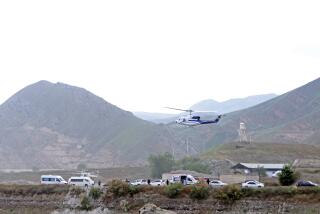NRC Investigating Allegations of Substandard Construction : Drug Tests at Nuclear Plant Prompt Firings, Complaints of Retaliation
On the day quality control supervisor Leslie Price was told she had failed a drug test--and fired on the spot from her job at Georgia Power’s Vogtle nuclear plant--she was furious.
Price said she tried to climb over a desk and snatch the laboratory report from the hands of the supervisor who fired her. The report said she had traces of THC, the active ingredient in marijuana, in her blood along with another depressant.
Denying drug use, Price claimed she’d been fired for complaining to her superiors and the Nuclear Regulatory Commission about alleged construction problems at Plant Vogtle, the largest and most expensive single project in Georgia history, with an $8.4-billion price tag.
“I’m not much of a beer drinker,” she said. “I’ll hold one can for two hours or more. But on that day I bought a can and must have downed it in one gulp. I was just so mad you wouldn’t believe it.”
National Controversy
Drug testing of employees and job applicants is a national controversy, and Georgia Power was among the first companies to employ urinalysis on a wide basis.
The company began testing all job applicants in 1981 and began requiring the testing of current Vogtle contract workers in 1983.
The testing for drugs moves the nation’s drug fight into the heart of the American labor force, into the plants and into the offices of many Fortune 500 companies.
Advocates see testing as a means of assuring a safe work environment. Opponents view drug testing as an invasion of privacy and a violation of Fourth Amendment protections against illegal searches.
Since her termination in February, 1985, Price and four other fired workers at the plant who failed or refused to take urinalysis tests have challenged the utility company’s testing program. They are seeking reinstatement and back pay.
Price is joined in the suit by Susan Register, another quality-control inspector, and her husband, Britt, a former surveyor; Steve McNalley, an ex-electrical inspector; and Billy Weatherford, a former chief in the survey section. Weatherford and McNalley refused to take the test and were fired last year.
Company officials told Register she did not provide enough of a sample to test. When she refused an order to produce another sample, she was fired.
In a complaint filed with the U.S. Labor Department by the Georgia chapter of the American Civil Liberties Union, the five say they were fired after reporting substandard construction practices at Vogtle. They contend that they were fired for voicing their complaints.
The secretary of labor is expected to decide soon whether to allow the filing of the complaint, which came several weeks after the 30-day filing period required by the federal “whistle-blowers act.” That law is aimed at protecting workers who report suspect activities on the job.
They initially were turned down in their suit by an administrative law judge because they filed late.
Lorie Fowler, an Atlanta attorney for the five, said Georgia Power--which owns 45% of the plant and is its operator--was cited by the NRC in 1984 for failure to conspicuously post the act.
She said the company also was told by the NRC to change to a new form for notifying workers of the act and the company failed to do so.
The NRC is investigating the fired workers’ allegations about improper construction techniques.
One claim is that one of the containment domes is riddled with air pockets that could render it ineffective in the event of an explosion in the reactor.
“We don’t necessarily want to stop the drug-testing program,” said Fowler. “We want to make sure drug testing cannot be used to get rid of workers.”
Safety ‘Upmost Concern’
The utility denies any motive other than safety.
“When you’re building a nuclear power plant your upmost concern is safety--safety of the workers and safety of the project,” said Georgia Power spokesman Craig Lesser.
Howard Winkler, the utility’s labor-relations coordinator, said he is “extremely confident” that the drug-testing program is working and is supported overwhelmingly by Vogtle workers.
“You’re looking at five employees in this complaint,” said Winkler, “and we have roughly 10,000 people working at Vogtle.”
“It is one of the best things this company has done and it has enhanced the safety at the site and the quality of the work,” said Winkler.
Georgia Power began drug testing at Vogtle after supervisors suspected drugs were behind some of the accidents at the plant.
Since the testing began, the number of accidents has dropped. Before the program, the company experienced 5.4 accidents per 2,000 man-hours. The national average was 3.8 accidents. By last year, the accident ratio dropped to 0.48.
The drug testing can be initiated by a supervisor or through anonymous tips on a toll-free telephone hot line.
That hot line has become controversial, with critics charging it is used to harass or to get rid of workers who claim shortcuts are taken in building the plant dominated by two looming 547-foot-high containment domes rising above the surrounding forest.
The drug testing comes during a period of negative public attitude toward the plant, mostly because of its $8.4-billion cost. When the company announced plans for the dual reactor in 1971, the cost was estimated at $660 million.
‘Image Problem’
“Georgia Power has an image problem now,” said Georgia Public Service Commission spokesman Jon Grant.
The five former employees in the complaint filed by the Georgia chapter of the American Civil Liberties Union with the Labor Department were given the “Emit” urinalysis test only once, said their attorney.
“There was no background test, no gas chromatography test as a backup,” she said.
Company spokesmen said the procedure for testing includes gas chromatography but they would not discuss the complaint filed by the five people nor would they say if a backup drug test was given them.
“I can’t say for absolute fact what was the case with these people,” said Winkler. “We just can’t discuss it.”
‘No Backup Test’
“We had a meeting with company people before we filed the suit,” Fowler said, “and they admitted that at that time there was no backup test.”
In 1983, the Centers for Disease Control found a 4% “false-positive” ratio in the Emit test, developed by the Syva Co. of Palo Alto, Calif. The company recommends that positive findings be confirmed by other tests, which can be expensive. A 1985 report by the CDC found a 6% false-positive ratio for cocaine and higher error rates for other drugs.
Georgia Power’s drug testing procedure, refined since its initiation, involves splitting the urine samples and conducting a second test if the first shows traces of drugs.
“Say a sample shows positive for THC,” said Winkler. “At that point, it is tested specifically for THC. If that test is negative, even though the initial screen was positive, then the sample is considered negative.”
A Third Test
If it comes up positive, then a third test is conducted, a gas-chromatography mass spectrometry test.
Winkler said if there are further questions about the results, testing of some of the sample left frozen with the company can be brought in for another look.
Lesser said there were approximately 8,000 people tested last year for drugs, both for pre-employment with the company and for those contracted to work on the Vogtle plant.
He said of the 8,000, approximately 200 failed or refused to take the test. The company does not distinguish in its figures between those who fail the tests and those who refuse to take it.
Questions Remain
“I don’t know what was followed as a matter of absolute fact” in the cases of the five who are suing the company, said Winkler.
The labor relations director says other utility companies and other industries call regularly to inquire about Georgia Power’s drug-testing program.
“I tell them that a well-designed drug program should never detract from employee morale,” he said. “Rather, it should build employee morale and should be fair and equitable and necessary. If it is resented by employees, if it is seen as an invasion of their rights, then you’re going to have problems.”
More to Read
Start your day right
Sign up for Essential California for news, features and recommendations from the L.A. Times and beyond in your inbox six days a week.
You may occasionally receive promotional content from the Los Angeles Times.






